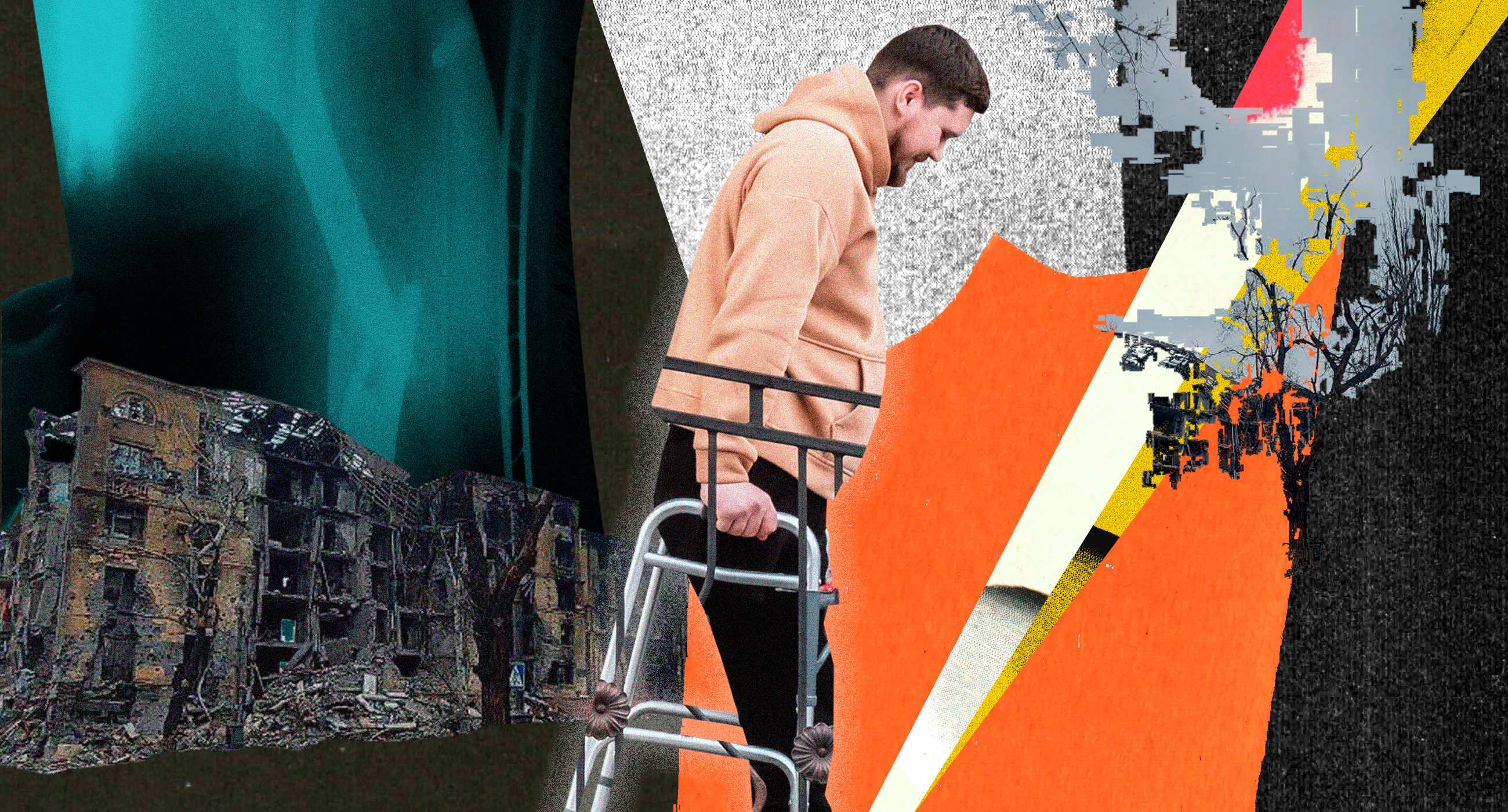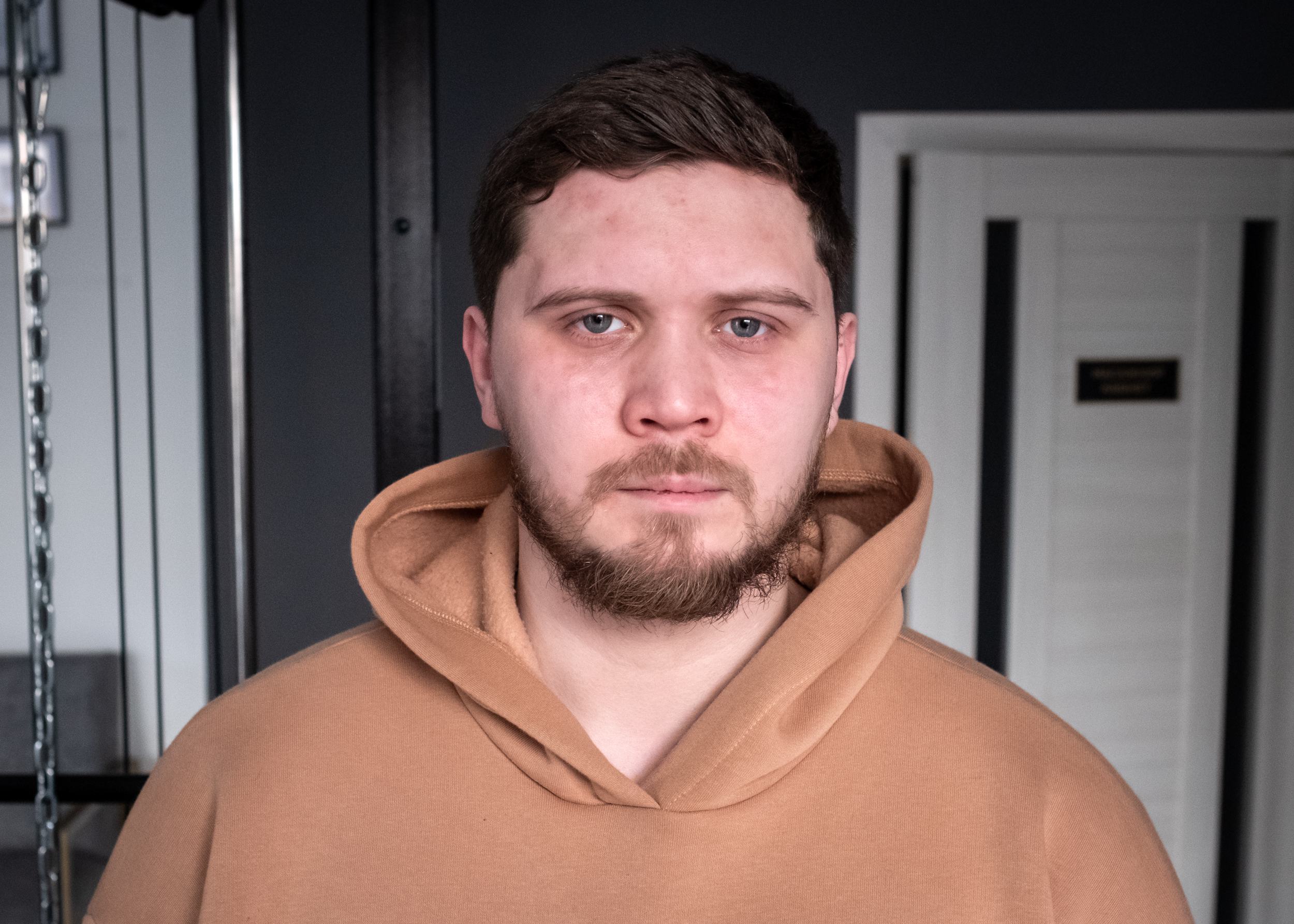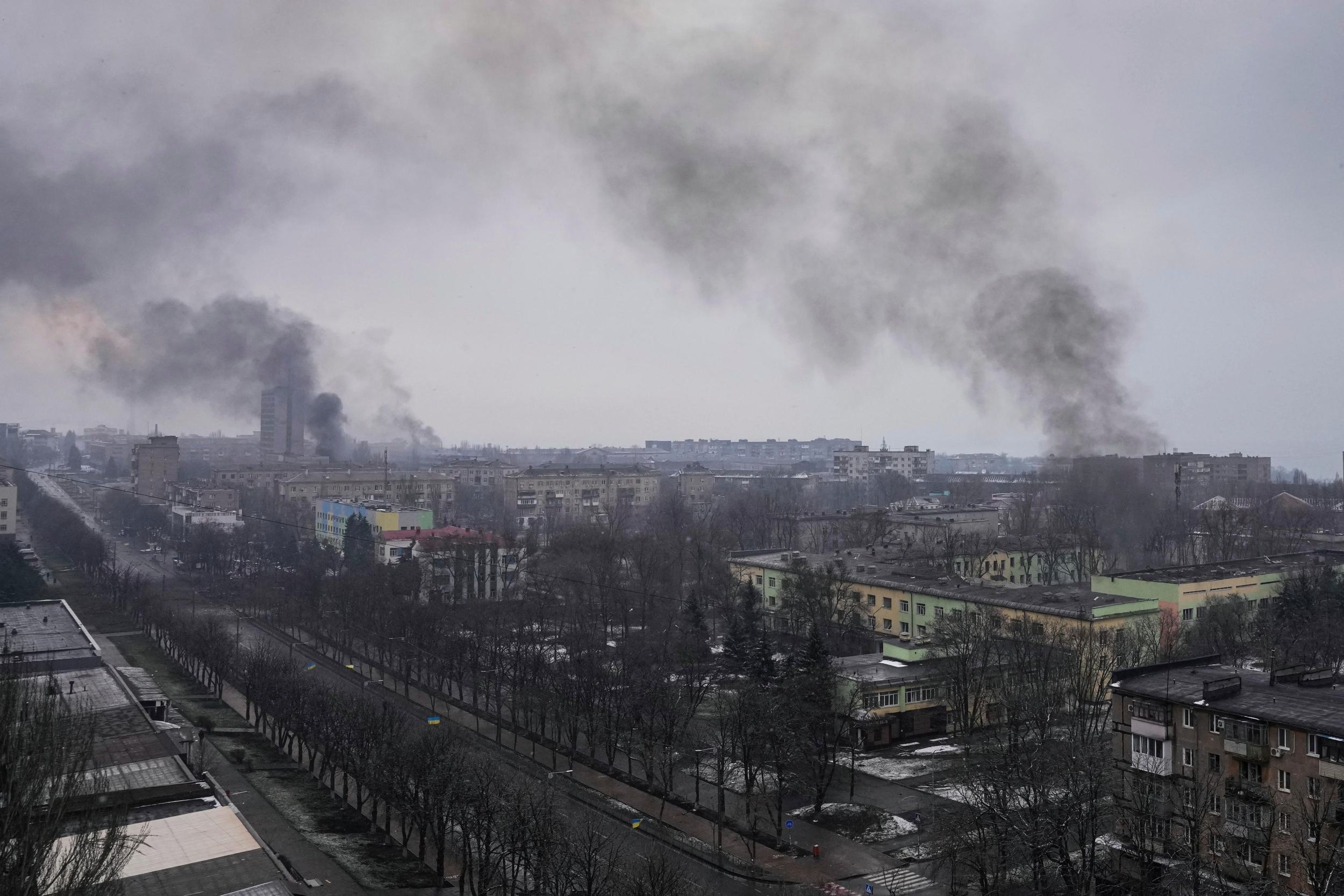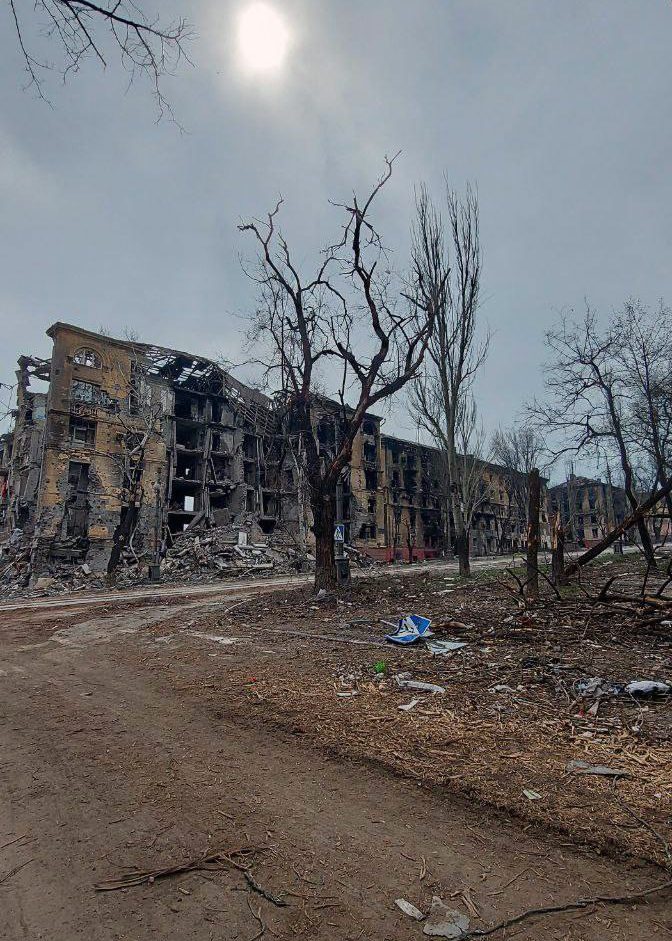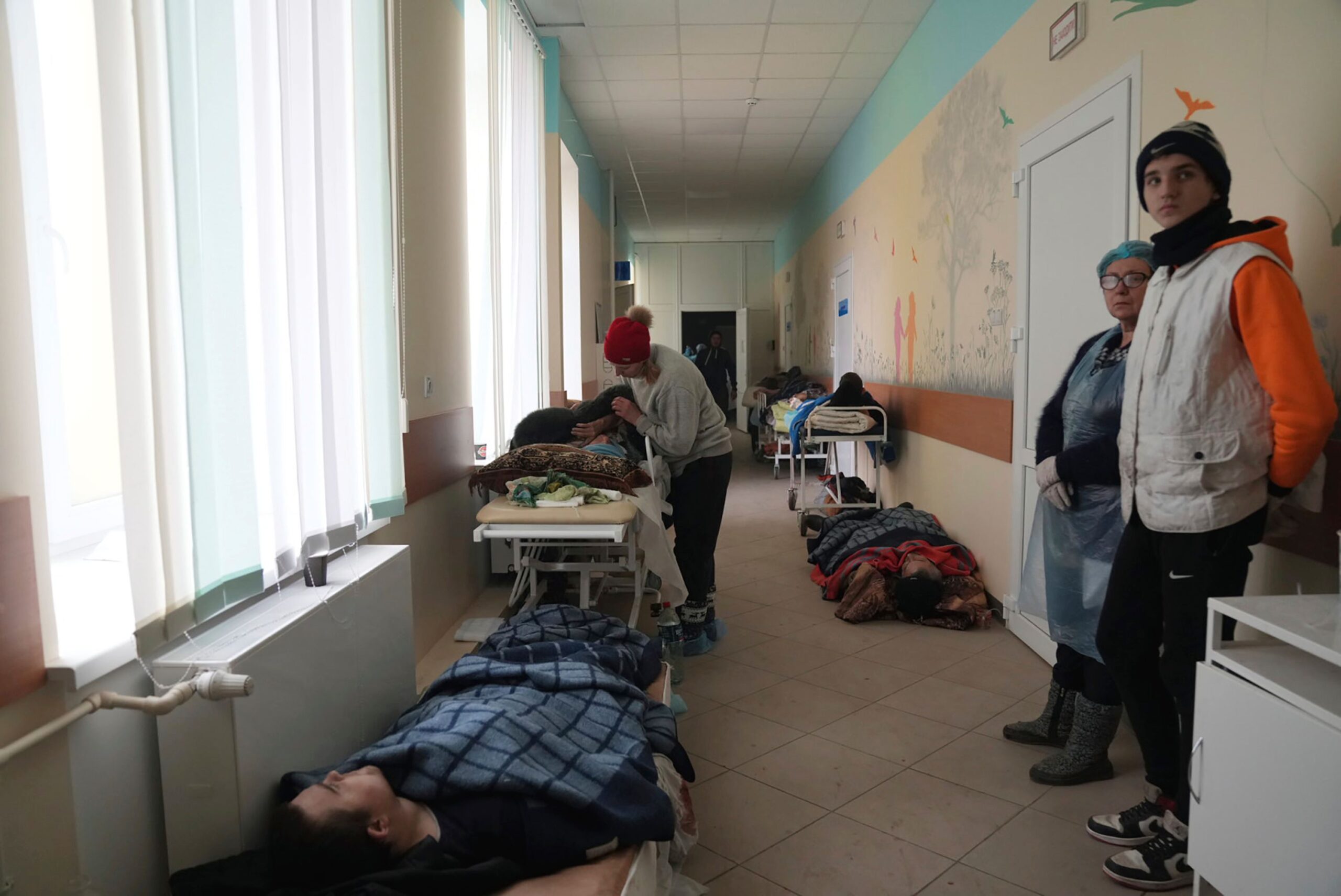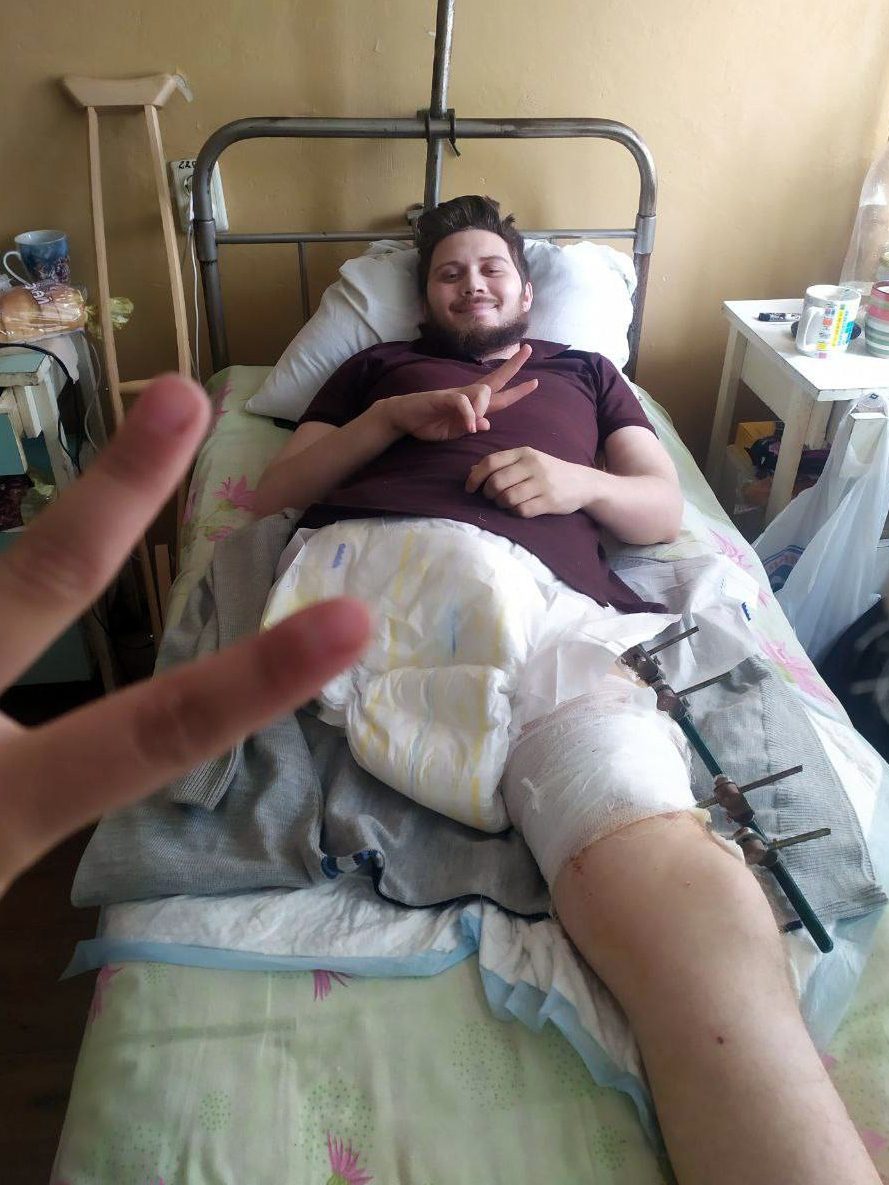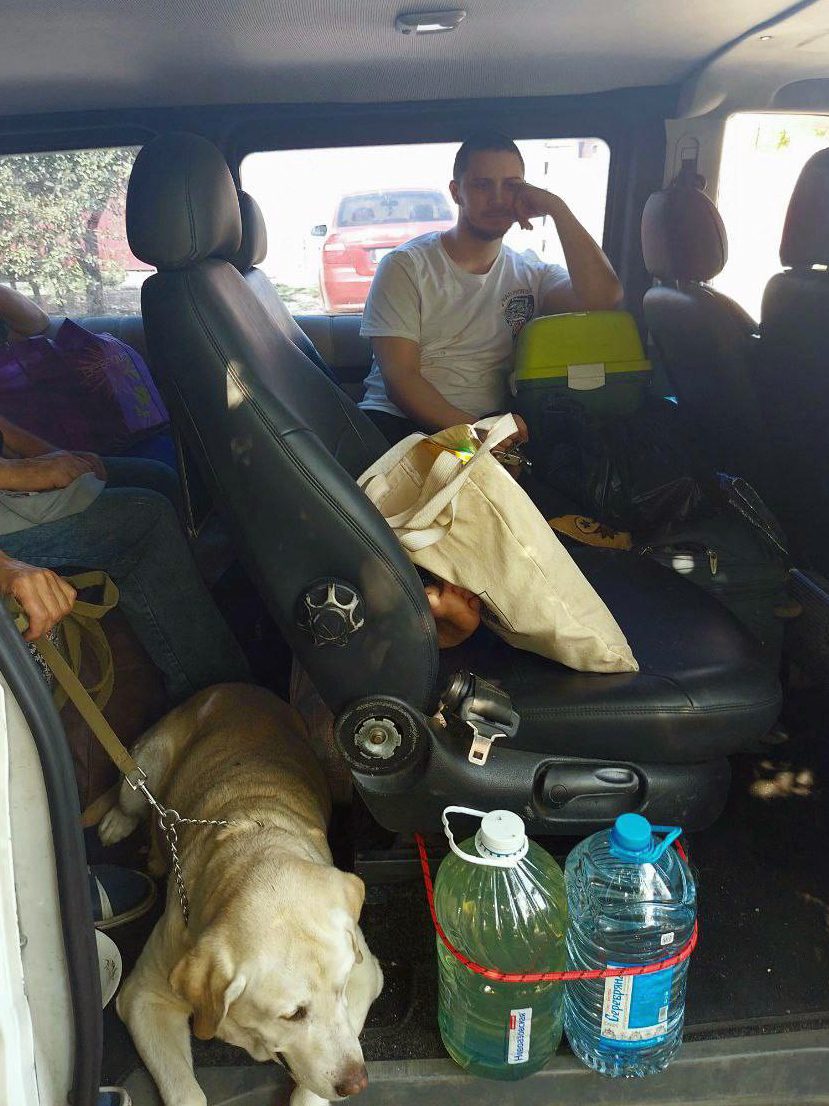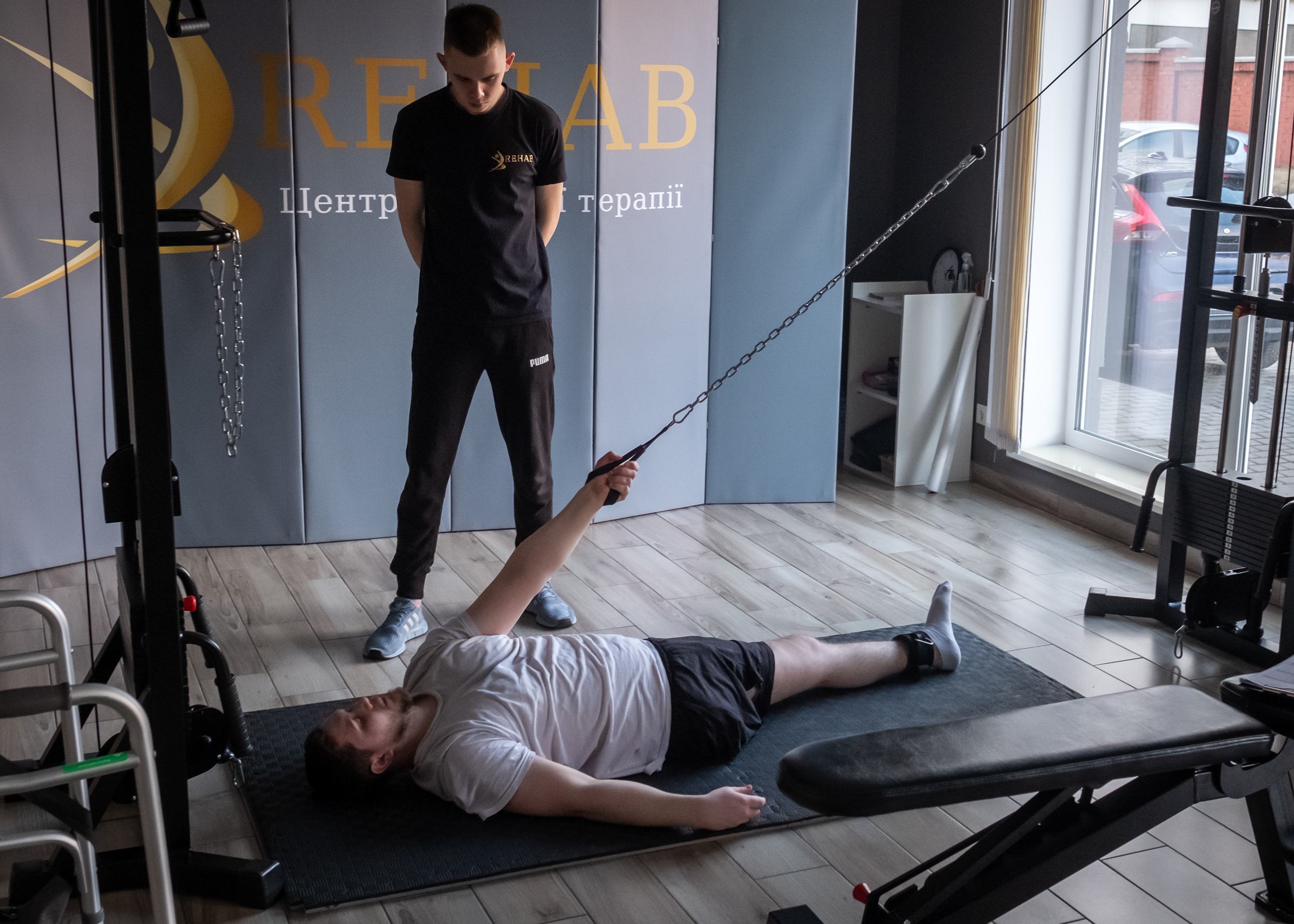A 26-year-old resident of Mariupol, Vladyslav Beskrovny, should now be working in his barbershop and preparing for a wedding. Instead, he lost his home, his leg, went to the hospital with a methadone addict from the DPR, spent the night in a medical mechanical bed in the garage, used crutches to get around, and almost burned himself in the hospital. Zaborona journalist Polina Vernyhor met with Beskrovny to tell his incredibly strong (detailed and terribly cinematic) story.
How I met Mariupol
I was 17 years old when I had to leave my native Kramatorsk. In 2014, it was quite hot there. My father was already working at a factory in Mariupol. I entered the Mariupol technical school and lived with my father. At first, we discussed moving to Odesa because the Russians also targeted Mariupol. My father didn’t want to, but I went — lived there for a few months, and returned.
At first, I took on odd jobs and then got into a barbershop. I got to know the guys who worked there and was fascinated. Three years have passed. At the beginning of 2022, I was going to work for myself: rent a place and work with my client base. I planned the opening of the point for February 20. At the same time, my girlfriend and I were going to move to a bigger apartment — a friend left Mariupol and his apartment for us. My trucking client initially agreed to help move things. But when I called him on February 24, he didn’t pick up the phone. So we stayed in a small apartment in the Illichivsk district on the ground floor with collected things in the corridor.

Vladyslav Beskrovny. Lviv, January 2023. Photo: Pavlo Bishko / Zaborona
Awareness
First, second, third day. Some sirens, some movement. My friends were running away from the city, and it seemed they were spreading panic. We discussed all the events in our corporate chat with customers and artisans for some time. Then the connection disappeared. Miraculously, we managed to get cereal, meat, and some food for a dog and a cat.
When the connection was lost, there was still electricity. Everything worked on electricity in our apartment, so we generally felt good. In early March, the electricity was turned off. It was freezing. We cooked food at a neighbor’s place — he had a gas stove. One day a girl woke me up and said: “Look out the window.” Downstairs, the neighbors arranged a kind of picnic. There were fireplaces near each entrance on which people heated water and cooked food. We understand: now there is no gas either.
People started taking everything from the shops. There were several shops near our house — grocery, cosmetic, and household. There was complete chaos near them; someone called my neighbor to join. It seemed wrong to us — as if we were robbing someone. But I felt that there was no other way. The windows were mostly empty. People took cigarettes, alcohol, boxes of shampoos, and tubes of toothpaste out of the shops in bags. It wasn’t for survival because why does one need kilograms of toothpaste? Once, the police and military came to one of the pharmacies: they opened the door and took adult diapers, painkillers, bandages, and everything necessary for first aid. Then civilians were allowed to enter the pharmacy. It was already like a green light for the population: take whatever you can to survive.
My neighbors and I went shopping in an organized manner and kept reports. Once a shell hit a house nearby, where there was a large store called “Cascade.” Civilians ran there almost immediately after the explosion. When we arrived, only bags of cement remained. Initially, they planned to take them away and install the ground-floor windows. But then they imagined how the Russian military would enter the yard, see the boarded-up windows, think that the Ukrainian army was hiding there, and simply shoot us.
Survival
Over time, we got used to the fact that there was no electricity or gas. We literally all lived near the entrance. A military hospital was next to the house; a shell also hit it. It was scary to go there, but we decided to look for something useful with a neighbor. A lot of wood remained: doors, chairs, Swedish walls. All these, people could use to light a fire. I took batteries and office knives and found several helmets and a manual on Russia’s military aggression against Ukraine.
Everyone, who was present, sorted wood. Then a neighbor came and offered us a duck. It turned out that he and his wife were planning to leave Mariupol. They gave us the keys to the apartment, where all their products remained: cereals, oil, and preserves. A window opened onto the street — we used it as a refrigerator. Thanks to these products, my neighbors and I survived.
At one point, Russians shelled our area in such a way that most of the windows in the house were blown out. We were lucky: our windows survived. We covered all the holes with boards so that no one would climb to the neighbors who had left. We went to these apartments ourselves in an organized manner. They watched who took what so as not to take too much. We took medicine, food, and household items. Once a neighbor gave me a mountain bike. I could sell my soul for him at that moment — I was very happy.
I often thought about how nice it would be to visit my father in Volonterivka, a neighborhood near ours. He once talked about his plan in a conversation with a passerby. I asked if he knew what the situation was in that neighborhood. He said there are chances to drive there, but only if you know the area well. And I am not from Mariupol — I only know the streets where I live and work. I was afraid to go.
We found a well and went there to get water. An eerie picture opened from the queue: the hill from which “Point-U” protruded was visible — it looked very large-scale. Once, not far from our line, a drone was shot down. The girl and I heard and ran aside. But the majority continued to stand — that’s how important it was for people to collect water. More important than survival.

Smoke rises over the city after the strikes on Mariupol, March 9, 2022. Photo: Yevhen Maloletka / AP
Why I don’t like fish
On March 26, a girl from the house opposite came to our entrance. She said that, together with her neighbors, she found a fish shop, and now they have a lot of fish — she wanted to exchange it for some products. We found some biscuits and cereal and gave them to them because there were children and older people among them. It turned out that “a lot of fish” is a layer of minced fish and sprats.
About three kilograms of minced fish. At the beginning of six in the evening, I lit a fire near the entrance, heated a frying pan, and began to fry cutlets. All this time, I heard shots, explosions. But it seemed that it was somewhere far away. I fried the last batch of meatballs, put them on a plate, and when I turned to go home, I just fell down.
I didn’t hear a plane or a rocket. I lived in this hell for almost a month, so I knew all these sounds by heart. Only then did I realize that something heavy had flown into the yard. It cut an artery in my right leg, and I saw a bone in my left leg. One of the fragments got stuck in my hoodie and cut through the skin about five millimeters.
I started screaming. There was smoke, and I was stunned. I didn’t know if I was making any sound. My girlfriend ran out, grabbed me by the armpits, and dragged me into the entrance. Says: “Come on, get up.” And I can’t feel my legs.
Neighbors ran to me, and panic began. I was doused with peroxide and injected with a blood-stopping drug. The girl found a man in the area with a car who agreed to take us to the hospital. They put me in a blanket and stuffed me in a “moscvich.” When we were driving, the girl shouted out the window not to shoot us because there was a wounded person in the car — at that moment, it was already curfew. I sat behind and held a rag to the wound, trying to stop the bleeding somehow.
Since then, by the way, I don’t eat fish.

Destroyed houses on Kuinji Street. Mariupol, April 2022. Photo courtesy of Vladyslav Beskrovny
Endure pyrosis
We arrived at the Center for Primary Health Care. I tried to explain the best way to transport me to the paramedics, and then I just blacked out. I remember everything in fragments: how they took me on a gurney, and then they put me on a couch and started cutting my clothes; as I screamed; how they did something to me and put me in the ward. I was hysterical. They put a tube in my nose so I wouldn’t choke if I felt nauseous.
On the second day, three doctors came to me. “How do you feel?”. I say it’s normal. “Can you move your toes?”. I moved and then looked down at my feet as one of the doctors quietly inserted a needle into an artery. I realized that I was moving my fingers only in my imagination: I did not feel this needle and legs. One of the doctors said that amputation was necessary but warned that I might die during the operation.
I refused to do it now — it was necessary to say goodbye to my beloved. At that time, one of the doctors who worked there was being operated on at the hospital. He was transporting a patient from the basement, and he was shot. Then I realized that it was not a fact at all that my girlfriend could get home alive: there was no connection to ask.
Some medical workers treated me very rudely. They gave us a 50-gram cup of porridge and water, which gave me heartburn. When I asked to drink some other water, one of the orderlies shouted at me and covered me with a mat — they said there were children without arms and legs, and I couldn’t stand the heat. And it really seemed to me that I was going to die now.
I turned to the other side, and there was a red flame
On the third day, a shell hit the hospital. All the glass in my room flew away. I covered myself with a blanket, but the debris got into my neck. I started shouting to get us out of there. Someone rolled my bed into the hallway. The first time the doctors were there with us. And at some point, everyone got together and left — those who could go. They didn’t even tell us anything; they just left us lying there.
There were eight of us lying in the corridor. And so we lay for about a week and a half. A few days after we were abandoned, civilians came to the hospital searching for medicine. One of the men brought us a can of tuna and fizzy pills, which made the water a little more pleasant. He promised to pick me up the following day. But the only thing that mattered was that he found my girlfriend and told her I was alive. In the morning, no one came back for me.
The hospital continued to be shelled. The department started burning from below, on the street side. There was one man among us who could walk, but he was terribly afraid to see what was there. So I lay there wondering if we were all going to burn alive.
The door was blown away, and the ceiling fell. I turned to the other side to look out the window, and a red flame and carbon monoxide filled the room. I took my water, soaked the blanket, and covered my mouth. People appeared — relatives of hospital patients — and took us to the garage, where the ambulances arrived.
A guy came to this garage, I think he had something wrong with his psyche. He helped the women out of the garage, but when I asked him to help us, he laughed and just walked away.

People injured by shelling lay in the hall of hospital number 3 in Mariupol, Ukraine, Tuesday, March 15, 2022. Photo: Evgeniy Maloletka / AP
Open the door in four hours
So we were left together with another guy who called himself Ruslan. He had a book with him that he gave me to read, but I couldn’t read it anymore. He had a wristwatch – we played word games with him for two hours. Someone shouted “Help!” — as loud as they could every five minutes. We understood that they heard us, but no one was coming to help.
We talked about the fact that we would have to lie naked in this garage all night, and it was freezing. Then I offered to go to the door that led to our department: it had burned down, and the smoke should have settled by now. I leveled myself with the help of crutches, drove to the door, caught hold of it, and pulled myself up. It took us about four hours to open the door.
Eventually, they opened but could snap back at any noise. We had a plan: Ruslan stops at the door, I push back with my crutches, and push his gurney inside. Next, I throw him a crutch, which he reaches out and pulls me inside. Logical and simple.
But there was a steep descent on the other side of the door. Therefore, when I pushed Ruslan, he just rolled down. Thank God the crutches stayed with me. I tried to drive in that door for another hour and a half.
Ruslan had a lighter — I shone the light around me and saw an eggplant. There was little water there with ash inside. But it didn’t matter, I really wanted to drink. I quickly fell asleep.
Rescue
Around six in the morning, two more drones were activated in the hospital. We woke up and started calling for help again. Someone shouted something like “we will help you now” in response, but that was the end.
Then a grandmother entered the corridor where we were lying. I begged her to take us to the basement. She went to look for a way out and then came back and rolled us out. Maybe thanks to this woman, I survived then. I don’t know where she had the strength to push my bed.
When we got to the street, some men – medical personnel or doctors — ran to us from the basement. They rushed at us shouting, saying, why did they take us out of the hospital now, the shelling should start now. It was as if someone had poured cold water over me. I said: “I don’t even know what time it is now. You scored on us, and I just want to get to a safe place.”
They drove us to the basement entrance, where several dozen men were frying potatoes. Rescuing us is dangerous, but cooking food in the yard is okay? I was into the corridor — the two women who were taken out of the garage were already lying. The orderlies walked by, and then, in the ward, they ignored me — they didn’t even look me in the eye. It must have been embarrassing.
This man, who attacked us on the street, began to scare me that they didn’t bring Ruslan in time, that it was my fault. I was very scared. Then they said it was a joke. He just instilled fear in me. Someone gave me a cigarette, I quickly smoked it, then another. Couldn’t calm down.
Tour of “DPR” hospitals
Later, I was transferred to another corridor. I began to hallucinate. I dreamed that a shell was exploding nearby. I screamed in my sleep, woke up, and saw the darkness in front of me, and it seemed to me that it really happened.
But it was still calmer among people. On the evening of the second day, everyone began to fuss. I asked the nurse what was going on. “Now, there will be an evacuation to Sartana.” I didn’t know what flag Sartana was under now. It turned out not under Ukrainian.
As a seriously injured person, I was one of the first to be taken out of the hospital. My bed was carried through the entire hospital. At some point, someone stopped me. A military man with a “DNR” chevron came up and asked what to do with me because my bed would not fit in the car. I told them to transfer to the blanket. I didn’t know what made me scream more — pain or anger. They put me on an awning stretched between two metal sticks and dragged me into the ambulance. A soldier sat down next to me, resting his foot on my “couch” so I wouldn’t fly over the car.
We drove about half an hour to Sartana. There we stopped at a kindergarten. Stayed overnight. In the morning, a man with a Russian chevron arrived and said that we were being evacuated to Novoazovsk. The hospital in Novoazovsk resembled an old country house with white walls. It turned out to be some military hospital. The doctors examined me, took an X-ray, and left me in the corridor. It was very crowded in this room: in addition to me, there were about 60 patients — civilians from Mariupol, the Russian military.
At some point, I realized that I didn’t have the strength to lift the water bottle and I was going to pass out. Several paramedics ran up, grabbed me on a stretcher, and dragged me to surgery. The last thing I remember is how my hands and feet were tied.
Loss, meeting
I woke up without my right leg. The amputation was to the groin. I was in the surgical ward for three more days with a temperature below 40. Then I was transferred to the general ward. The DNR people and Chechens lay with me. They asked me what I thought about Azov. I replied that they were ordinary guys, I had cut their hair before the full-scale war. They technically put me to silence: “You can’t say anything good about Azov here. Just keep quiet.”
The nurse gave me her phone — I was able to call my mother in Kropyvnytskyi, I posted a story on Instagram that I was looking for a girlfriend. Then my friend transferred 8 thousand hryvnias to the nurse’s card, she brought me a phone — some cheap Chinese model. I had a connection.
A few days later, a Russian soldier came to me and said they would send me to Donetsk for treatment. However, on the day when I was supposed to be transported, it turned out that I was going to Makiivka. I was in no position to argue.

Vladyslav in Makiivka hospital. Photo courtesy of Vladyslav Beskrovny
I was admitted to the second hospital in Makiivka. I met a volunteer who agreed to find my girlfriend in Mariupol for a thousand rubles. I said I don’t have that kind of money, and he left. And then unexpectedly dropped a photo of my father’s house. It turned out that he did go to look for my relatives. That’s how my father found out and gave my girlfriend the phone number. Then we called her for the first time in probably a month. They agreed that he would come to me. We found her an apartment there so that she could visit me often.
A methadone neighbor
In Makiivka, they started working on my injuries and put stitches in my non-amputated leg. Then something like Ilizarov’s apparatus, its simplified version.
Once, Maxim from DNR appeared in my ward. Then the trash started. He constantly complained that he did not receive enough attention from the doctors and became hysterical for any reason. His parents came to him and brought bottles of pharmacy alcohol. He got drunk and shouted at my roommate and me, saying we were to blame for what happened because we did not oppose the “Nazi regime.”
Sometimes friends came to him, and already together, they drank pharmacy alcohol again. And somehow, they started injecting drugs just in the ward. I understood from their conversations that it was methadone. I captured it on camera and told the nurse to either transfer me to another place or him.
One evening, he, drunk, once again attacked my neighbor from Mariupol. Medics rushed to pull him away. Then he was already put in another ward — where people like him, from DNR, were lying. Finally, I was able to rest.
The way to where everything is native
My girlfriend and I discussed that we should leave. They found some service, loaded me on a stretcher into a car, and took me to the so-called filtering to establish who we were. After filtering, they went to an apartment in Makiivka and began to look for options to return to the territory controlled by Ukraine. Three weeks later, they found a carrier who agreed to take us out, but from Mariupol. It was August: and we returned home again.
We stayed in an abandoned house. Many practiced the following: those whose homes were destroyed looked for surviving houses and settled in them. I remember the first time we went to the city in the car of a girl we knew. I was shocked. There were almost no local people on the streets, but buryats were roaming the streets, many suspicious men, and everyone was shouting. We drove to my barbershop and our house — everything was in ruins.
The person who promised to take us out of Mariupol disappeared in the end. We stayed in the city for two weeks. Somehow I caught the Internet and wrote to everyone I knew that I needed evacuation. The Internet was down. Very soon, we were contacted by a man who called himself Denys. He was the driver of the Help People organization, which evacuated people from various occupied and front-line cities and villages.
The next day, early in the morning, Denys came to pick us up, he and my girlfriend, and our acquaintance loaded me into the car. Besides us, there were three more passengers and one dog. The cat in the carrier was placed under my feet, and our dog lay at my feet; I put my foot on my girlfriend. We spent a day and a half in this position.
As soon as we started, Denys ordered us to say at all checkpoints that we were going to Crimea. We had to get to know each other and learn the legend as if we were from the same house and wanted to visit Crimea because of our relatives. We were let through at all checkpoints. Denys behaved confidently and did not arouse suspicion among the Russians.
So we got to Vasylivka. There was a huge queue to leave, and there were 1,200 of us – we would have spent at least two weeks there because a maximum of one hundred cars were released daily. Denys approached some military man at the checkpoint and said that there was a wounded man in the car and that we urgently needed to go to the hospital. He promised to transfer us to the “preferential” queue. They told us we could leave at 10 a.m., at 3 p.m., then at 5 p.m. — so we stayed overnight in the car.

Vladyslav during evacuation from Mariupol, September 2022. Photo courtesy of Vladyslav Beskrovny
The next day we found ourselves in a convoy that passed the checkpoint in a few hours. They forced us to unload the whole car. The inspector growled at my girlfriend: “Put the dog away because now I’m going to shoot it. A dog bit me as a child, then I walked around the yard and shot them” — and laughed.
Eventually, they let us through. One roadblock, another, we go to “DNR null,” and we enter the gray zone. It was probably the scariest moment. We all go in silence. And now we see a new roadblock, and there is an inscription: “Glory to Ukraine! Death to enemies!”. My girlfriend and I were in tears.
Our guys opened the car, saw me, ran around, and let us pass. A Ukrainian military man entered the car at the next checkpoint and said: “Welcome home.”
Indifference
We arrived in Zaporizhzhya and got out of the car. I’m smoking, I’m shaking — I can’t calm down. The whole bus was calm, but my girlfriend and I were hysterical. I was genuinely surprised by how we were greeted — like in some American movie. Doctors immediately examined me, gave me a business card with free transportation around Ukraine and abroad, fed me, and gave me kits with hygiene products. For the first time in a long time, I found myself in a place where I was not indifferent.
Denys took us to Dnipro, where we spent a week with friends. I rested a little and ate normal food. We decided to order tickets to Lviv. A girl I knew met us and helped us find accommodation for the first week. I was immediately admitted to the hospital, and Ilizarov’s apparatus was removed. A week later, I was discharged.
At that time, I wrote a post on Instagram: I shared my story and attached card numbers for those who want to help. I can’t work; my girlfriend takes care of me — she can’t get a full-time job either. The post quickly spread — they started sending me donations, which allowed me to rent a room and pay for rehabilitation. There is hope for prosthetics, but it is too early to talk about the timing.

Vladyslav during rehabilitation. Lviv, January 2023. Photo: Pavlo Bishko / Zaborona
We will definitely come back
I often think about Mariupol. This city gave me the main thing – my profession and the love of my life. There my worldview changed, there I became myself. The war destroyed all my dreams.
When I watch Tik Tok or YouTube, I calmly accept Russian propaganda, disinformation, and lies in Russian news — none of this triggers me. But whenever I see something about Mariupol in the tape, it blows my mind. I cannot speak calmly because there is so much anger.
But it will definitely be released. I know for sure we will be back. I don’t know what we will do there, but it doesn’t matter. We will rebuild as best we can. It is my biggest dream.
Now Vlad and his girlfriend live in a small room in Lviv. Vlad is undergoing rehabilitation with funds from donations from those who care. You can help the hero and his girlfriend financially here:
Monobank: 4441 1144 4701 4497
PrivatBank: 4149 4390 4201 3700
PayPal: vladbeskrovnii123@gmail.com

